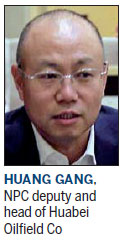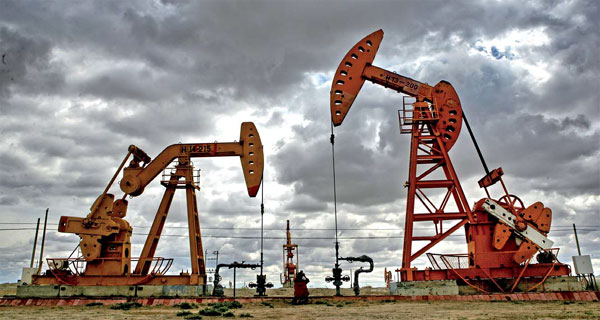Natural gas is new growth engine

Firms seeking alternatives in new energy as traditional fossil fuels run low
Huabei Oilfield Co has the world's deepest gas-storage tanks underground and has begun to provide a steady gas supply to the clean-energy thirsty region of Beijing, Tianjin and Hebei province.
It's part of the company's effort to develop new revenue streams, says Huang Gang, head of the company, which is headquartered in Cangzhou, Hebei province. It's a subsidiary of domestic energy giant China National Petroleum Corp.
| Huabei Oilfield Co pumps do their work in the Inner Mongolia autonomous region. In addition to oil, the company also provides natural gas. Liu Xuezhong / China Daily |
"New-energy resources have become an engine of growth, which is important in light of the complicated situation of a sagging global economy and volatile oil prices in recent years," he says.
Some oil companies are confronting the challenges of the dwindling nonrenewable resource, looking ahead to a time when oil may be all used up.
Daqing Oilfield, one of the biggest oilfields in China, has started to see dwindling of its resources.
It had maintained annual production above 50 million metric tons for 27 years, followed by a 12-year period at 40 million tons. But in 2015, annual production was reduced to 38.5 million tons, the first time below 40 million tons. It expects a further cutback to 32 million tons by 2020, according to a statement.
"Low oil prices have affected Daqing city's economy, which saw GDP declines for the first time," says Lu Hao, governor of Heilongjiang province, where the oilfield is located. Provincial revenue fell by more than 10 billion yuan ($1.53 billion; 1.38 billion euros) last year, Lu says.

Huang at Huabei Oilfield says, "It's time for oil producers to pursue sustainable growth from other promising sources."
Huabei started to diversify its energy resources during the 12th Five-Year Plan (2011-15), aiming to make the oilfield a comprehensive energy supplier, he says.
During the transformation process, more has been invested in the new-energy sector, especially in natural gas, from exploration to storage. And over the past five years, sales revenues in new energy has increased from 1.1 billion yuan to 6.1 billion yuan, which has facilitated the oilfield's growth in a diversified way, Huang says.
The company has been exploring gas storage since 2011 and holds gas in groups of underground storage tanks in Langfang city, 90 kilometers from central Beijing, according to a company statement.
"It began supplying Beijing, Tianjin and Hebei province on March 1, to meet growing regional demand - a result of changes in the consumption of energy for environmental improvement," Huang says.
The tanks store 800 million cubic meters, he says, adding that they are located at a depth of 5,000 meters, the deepest in the world.
Gas exploration is the wave of the future, he says. "We'll have more opportunities than challenges when facing the new normal of the economy."
zhengjinran@chinadaily.com.cn
(China Daily European Weekly 03/18/2016 page5)
Today's Top News
- Takaichi must stop rubbing salt in wounds, retract Taiwan remarks
- Millions vie for civil service jobs
- Chinese landmark trade corridor handles over 5m TEUs
- China holds first national civil service exam since raising eligibility age cap
- Xi's article on CPC self-reform to be published
- Xi stresses improving long-term mechanisms for cyberspace governance































